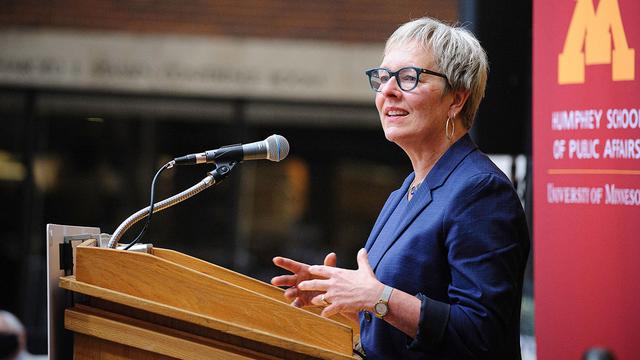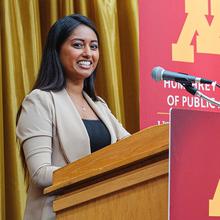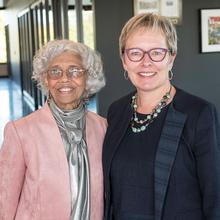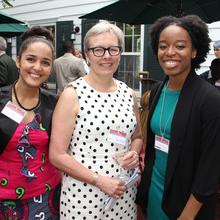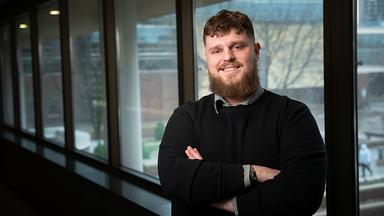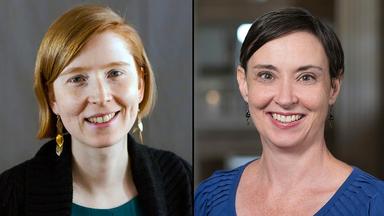As Laura Bloomberg ends her service as dean of the Humphrey School of Public Affairs today, thoughts turn to the legacy she leaves after her eight years of leadership at the School—four as associate dean, and the last four as dean.
Bloomberg is leaving to become Provost and Senior Vice President for Academic Affairs at Cleveland State University in Cleveland, Ohio, effective September 1.
At an August 5 farewell event in Bloomberg’s honor, friends and colleagues paid tribute to her as a leader, describing her as thoughtful; respectful; inclusive; trusted; engaged; caring and compassionate, even while making tough decisions; and “an amazing mentor.”
Others called Bloomberg a role model, because of her status as the first woman to serve as dean in the history of the School.
“I remember when Laura was named dean. For me as a young woman and especially a woman of color, it is important to see women in leadership,” Humphrey School alumna Amanda Koonjbeharry (MPP ‘14) told the community members, faculty, staff, and well-wishers in attendance.
“To lead such a powerful institution is no small feat. That moment in time really was impactful for me and I think for so many other students, because it gives us hope to believe that we can achieve those things, too.”
Kathy O’Brien, a member of the Dean’s Advisory Council, added: “I’m very proud of the fact that Laura was the first woman dean of the School. That symbolizes the values that we want to see in a dean and an academic leader. When I think of the various issues Laura has taken on, tough things to balance, she’s always done that with grace and respect for everybody involved.”
Bloomberg has indeed faced a variety of tough issues in her four years as dean, including the COVID-19 pandemic, the killing of George Floyd at the hands of Minneapolis police and the resulting protests and unrest that called for racial justice, which led the Humphrey School to examine its role in providing an environment that promotes diversity and inclusion.
Catherine Squires recalled Bloomberg’s offer a year ago to become associate dean of the Humphrey School, which would mean leaving her position as a communication studies professor, and why she decided to say yes.
“Partly because of the amazing things Laura has done, what she has built in terms of trust and excitement at the Humphrey School,” said Squires. “Even after months and months of pandemic, to hear the excitement and the real regard that people have for Laura, even in the midst of the worst days, I thought, ‘if I’m going to take a chance, this is the person I want to take a chance with.’”
Squires will serve as interim dean of the School effective August 24, until a new permanent dean is in place.
See more photos from the farewell event
Bloomberg also has a remarkable list of achievements during her eight years in the dean’s office: the School remains ranked as one of the top 10 public policy schools in the country; she led efforts to support the global expansion of the School, establish a national pathway program for college students underrepresented in public affairs programs, launch a Master of Human Rights degree program, and develop the Mandela Washington Fellowship program to support young leaders from countries across Africa. She also implemented revised equity and inclusion plans and launched new courses in race equity and social justice.
We asked Bloomberg to reflect on her time at the Humphrey School.
On being the first female dean of the School:
In some ways I think it's a very big deal, that this community could see a different kind of leadership as valuable. And that young men and women could see that the way it's always been doesn't have to be the way it always will be. On a day-to-day basis, the truth is I didn't think about it very much. I wanted to be the best leader I could be, not the best female leader. That I was selected seemed really consequential, but then the work is the work.
I am also quite proud of the fact that three women from the Humphrey School have moved on to lead other public policy schools in recent years: Jodi Sandfort at the University of Washington’s Evans School of Public Policy and Governance (2021); Carissa Slotterback at the University of Pittsburgh’s Graduate School of Public and International Affairs (2020); and Kaye Husbands Fealing at Georgia Tech’s Ivan Allen College of Liberal Arts. She was formerly the chair of the School of Public Policy (2014).
Accomplishments under her leadership:
The fact that these milestones happened on my watch doesn't mean they're my accomplishments. There is nothing that happens in a policy school that any one person can drive alone, so it's a team effort. But I will point to a few.
• We amplified the historic impact of key women in Minnesota, by creating the Josie Robinson Johnson Fellowship and the Josie Johnson Community Room; naming the School’s commons area as a tribute to Joan Mondale because she was a remarkable advocate for using the arts to advance the public good; and establishing the Jane Freeman scholarship for rural policy.
• We completed a successful $20 million fundraising campaign. When we include private philanthropy and private unrestricted foundation gifts together in that, we closed out our fundraising closer to $35 million, and I'm very proud of that.
• Our School has been ranked in the top 10 nationally for the past five years. A large part of it is having excellent programs, but another part of it is being present on the national stage. We created policies that incentivize faculty to be more engaged in leadership roles within professional associations.
• We began hosting the Junior Summer Institute, which is part of the Public Policy and International Affairs (PPIA) program that works to increase diversity in graduate public policy programs. It is essential that we change the face of public policy in this country. We cannot any longer have the level of homogeneity in our highest levels of government, when we look so different as a country. It's not a good way to make decisions. So programs like PPIA create a pathway for undergraduates into public affairs and public service in ways they might not have considered before.
Memorable experiences:
Some of my favorite student moments are watching them present their capstone projects to clients. I am proud of our School for preparing students so well. But I also see the pride students have in their own work and knowing that their work has value—not only for them to get their degree, but that it has value to the community—is just a wonderful thing to see.
I will also remember this faculty as my training ground for what shared governance could look like when it's really done well. I think shared governance is fundamental to higher education, and when it's out of whack, not only is there dissension, but we don’t make good decisions. I will forever have high regard for this faculty for being collegial—because sometimes it gets tough, sometimes we disagree, but we keep at it and people stay engaged.
Biggest takeaways from the Humphrey School:
Diversity and inclusion, especially in public policy schools, is so important. If we surround ourselves with people who are just like us, because that's where we're most comfortable, I think we sow the seeds of mediocrity.
I think we're excellent when we do the work to build leadership teams that are diverse across many dimensions. We are truly stronger when we're not all the same. It's one thing to say it, it's another to just understand it in your DNA, and I feel like that's something that I've learned at Humphrey and I will bring with me.
The Humphrey School is excellent because of the people who animate it. We are not excellent because we are exclusive. We are not marked by who we exclude, but by who we “include.” And I think that the Humphrey School has the potential on a national stage to keep driving home the message that we must be inclusive to be excellent.
The future of higher education is grounded in interdisciplinarity. Oftentimes, as academics, we are reinforced for pursuing a narrow breadth of knowledge that's very, very deep. But our capacity to poke our heads up and look at places where we can join in other people's work is where the value will be. And you can see that in the support from major funders like the National Science Foundation, which are far more likely to fund interdisciplinary work now than even five or six years ago.
Advice for the new dean, her successor:
I think that great leaders are people who work hard to know themselves and try to be the best version of themselves they can be. Because if you're not authentic, you're going to be a crappy leader. So I hope that the new dean is the best version of themselves that they can be as a leader. And I hope the community is generous in their support of that person, generous with their networks, generous with their ideas, generous with their open mindedness about what leadership can look like. So that would be my advice.
